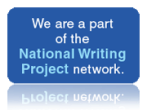NCTE November: Bringing together a Community of Educators

by Liz Corson
I arrived at the Baltimore Conference center on Thursday morning and happily bumped into Pauline Schmidt, PAWLP director, who had invited me to join PAWLP fellows to lead a roundtable the next day. This was my third NCTE conference and, by far, the most transformative, because of how much I felt a part of communities of educators.
One of these is an on-line community of educators. Through @ValBrown’s #cleartheair and #disrupttexts, I began learning from educators of color and reading books such as White Fragility by Robin DiAngelo and White Rage by Carol Anderson and Being the Change by Sara K. Ahmed.

At a Thursday workshop on Identity, Inquiry, and Equity, Jess Lifshitz, a 5th grade teacher who I followed on Twitter and through her blogs (https://crawlingoutoftheclassroom.wordpress.com/) shared how she teaches a critical reading process. “We can give them a critical reading process that they can apply to the reading they do in the world and the ways in which they live and interact with others in the world” (J. Lifshitz, NCTE 2019). This is something I am striving to do with my students constantly and year round.
Another presenter, Sara K. Ahmed, shared the importance of examining our own privileges as well as helping our students to recognize their privileges. On Saturday, I was able to speak with Sara in between sessions in the hall and thank her for her book, Being the Change, that a year ago, gave me the courage to start to explicitly bring identity into my classroom with my fifth graders through choices of texts, topics we study, and discussions we have.

Tricia Ebarvia, a PAWLP fellow and #disrupttext founder, led us in creating our own timelines and explained how our students’ time lines can be shared and discussed. Tricia shared Beverly Daniel Tatum’s (2000) work, “Who I am? The answer depends in large part on who the world around me says I am” (Tatum, The Complexity of Identity: “Who am I?”).
In addition, I grew closer to the PAWLP community. I became a PAWLP fellow two years ago. I had the pleasure of presenting at last year’s PAWLP day and am a part of the Anti-Bias Book club. Hanging out over dinners in restaurants, sharing pizza in a hotel lobby and talking long after the pizza had gone cold, enjoying s’mores and finding more books to buy, and diving deep into our passions and worries as educators, wives, mothers, and citizens, we connected and I felt lucky to be part of the PAWLP community.

And that was even before the Sunday brunch when PAWLP directors, Mary Buckelew and Janice Ewing, authors of Action Research for English Language Arts Teachers: Invitation to Inquiry (Routledge, 2019) presented. I had attended their workshop the previous day, along with other PAWLP fellows, and loved being guided by Mary and Janice and Liz Mathews to creatively reflect on my research question through sketching and poetry and sharing. At the brunch, in addition to hearing Mary and Janice talk about action research, we also got hear from Brian Kelley about his use of sketching to help slow down kid watching and noticing, and from Courtney Knowlton who shared her discussion with a colleague that helped her refine her action research, and Liz Mathews’ use of art to reflect. I felt lucky to be a part of such an incredible group of educators and grateful I had been able to spend time with fellow PAWLP educators.




